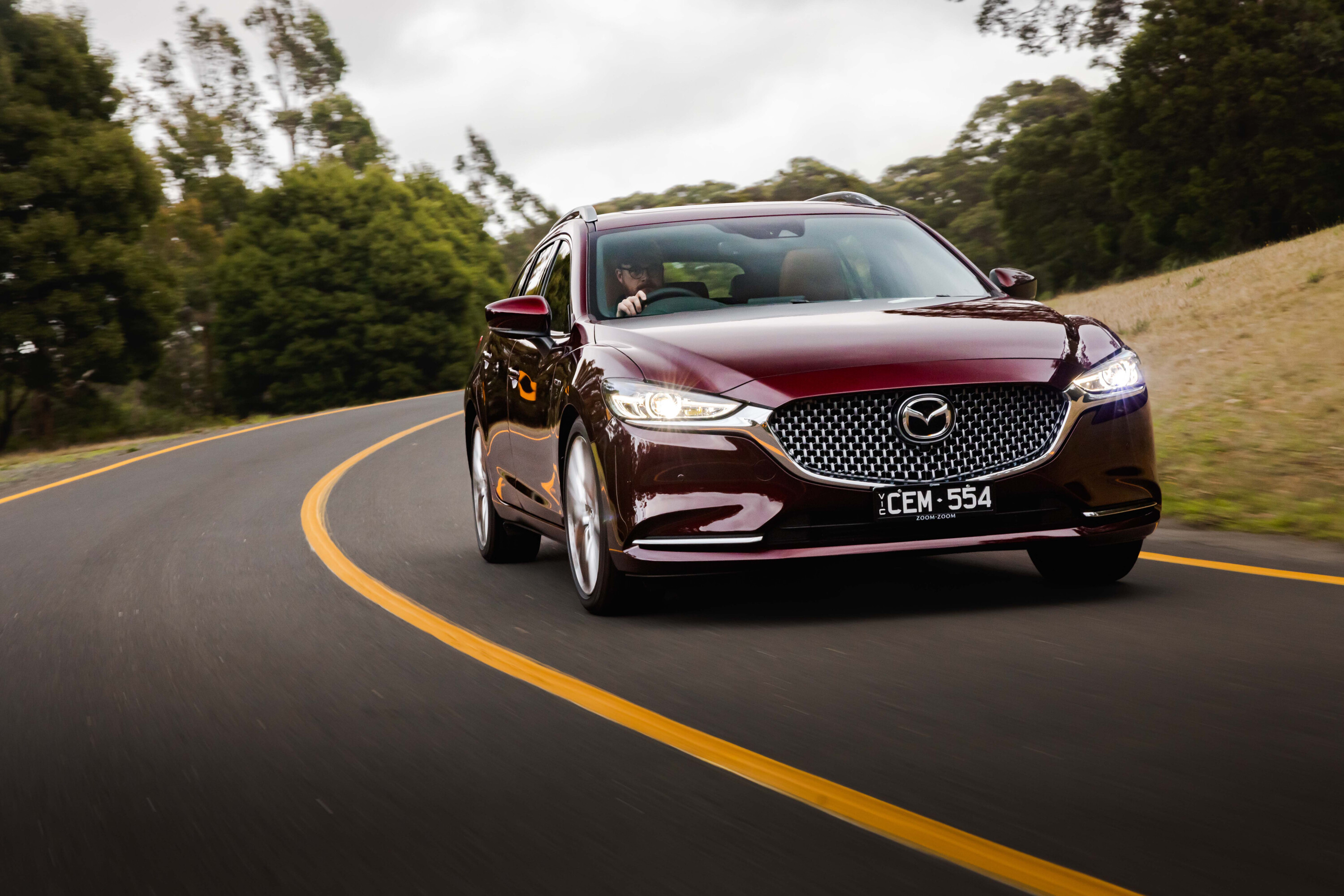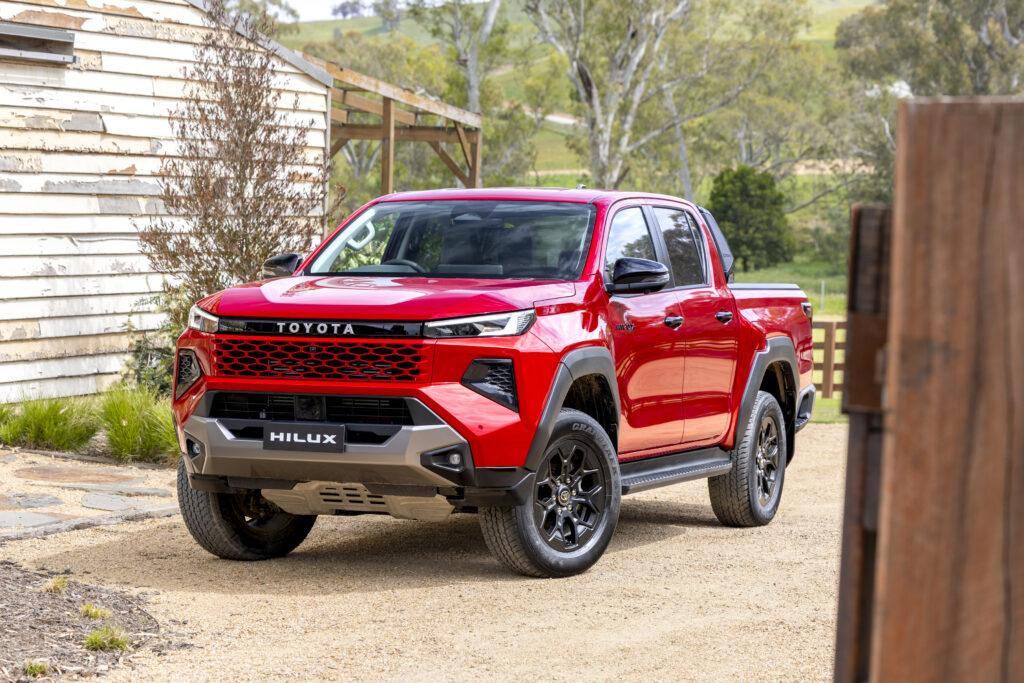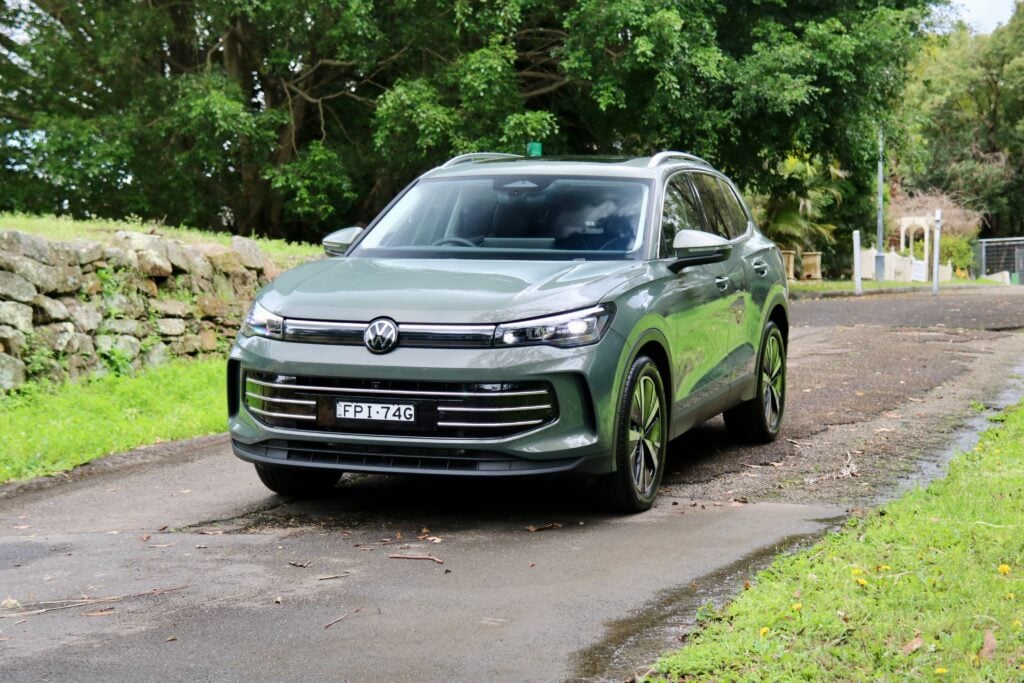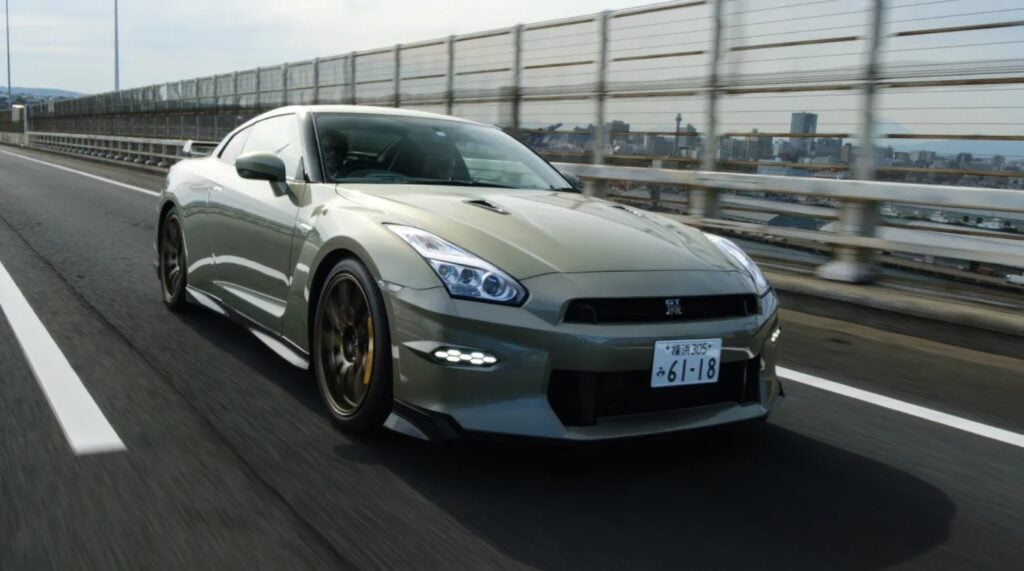Score breakdown
Things we like
- Excellent turbo engine
- Updated technology
- 20th Anniversary special
- Improved service intervals
Not so much
- Outdated infotainment system
- Lacks wireless Android Auto
- Thirsty powertrains
- No spec updates for base model
Just over 21 years ago, Mazda introduced the midsized 6 – a style-led successor to the 626 that heralded a new era for the Japanese manufacturer.
While medium passenger vehicle sales continue to decline, Mazda says it remains committed to the segment in Australia, with no immediate plans to discontinue the 6, either globally or locally.
With more than 25 per cent of Mazda 6 buyers upgrading from an older model – and 40 per cent from another Mazda – it enjoys a loyal customer base while continuing to provide an option to private customers who don’t want to settle for a Toyota Camry or fit into the SUV crowd.
The latest Mazda 6 remains based on the third-generation model that debuted in 2012, with more than 38,000 examples sold in Australia to April 2023 – compared to more than 150,000 CX-5s over the same period.
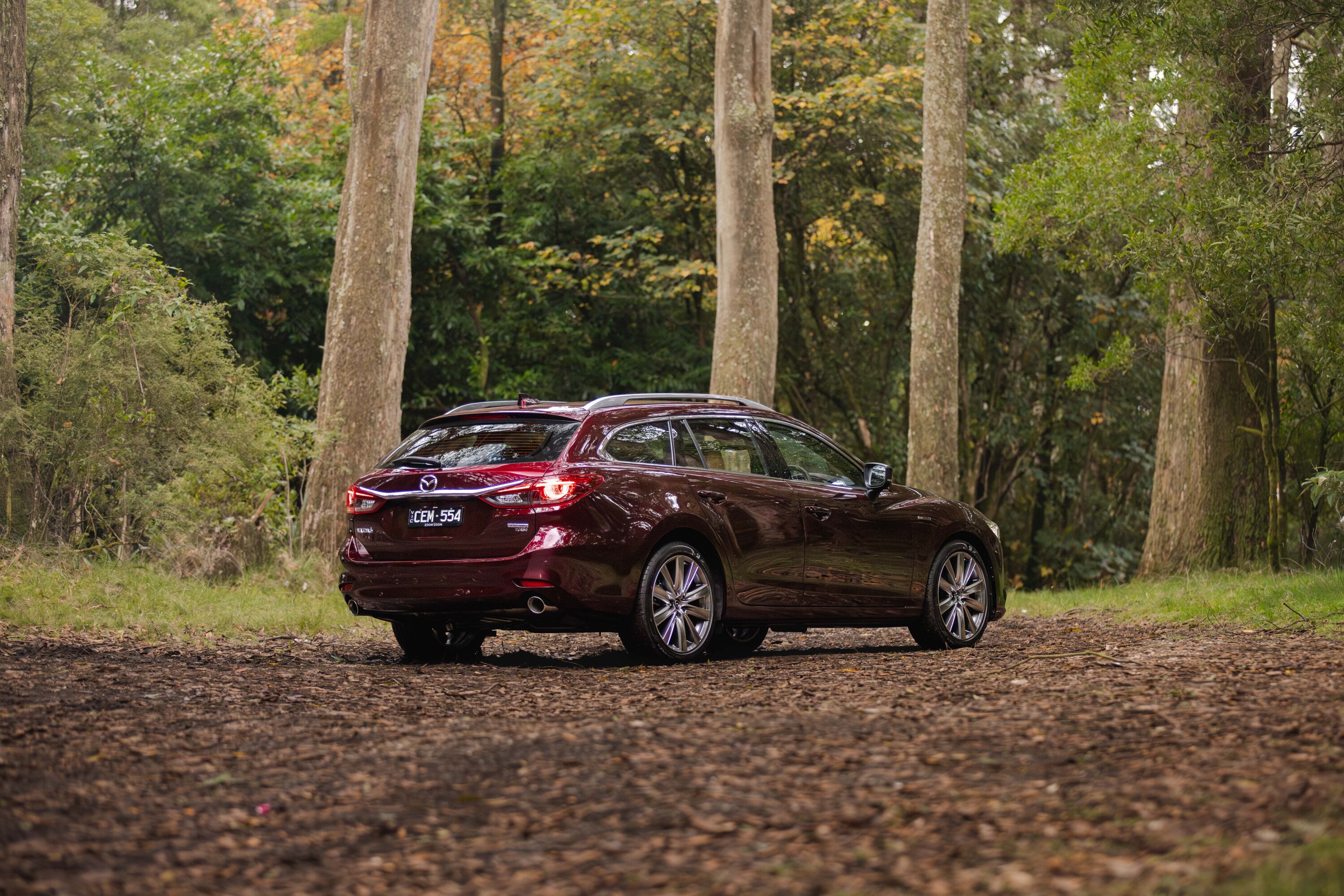
Announced at the tail-end of the 6’s two-decade anniversary last year, Mazda Australia has launched a minor update to its venerable midsized car – headlined by, you guessed it, a 20th Anniversary special.
Prices have increased by up to $1120, but all variants except the base G25 Sport have more equipment than before, such as wireless Apple CarPlay and a wireless phone charger.
Under the skin, all variants have updated power steering characteristics, while turbo-petrol models get several tweaks to improve the driving experience.
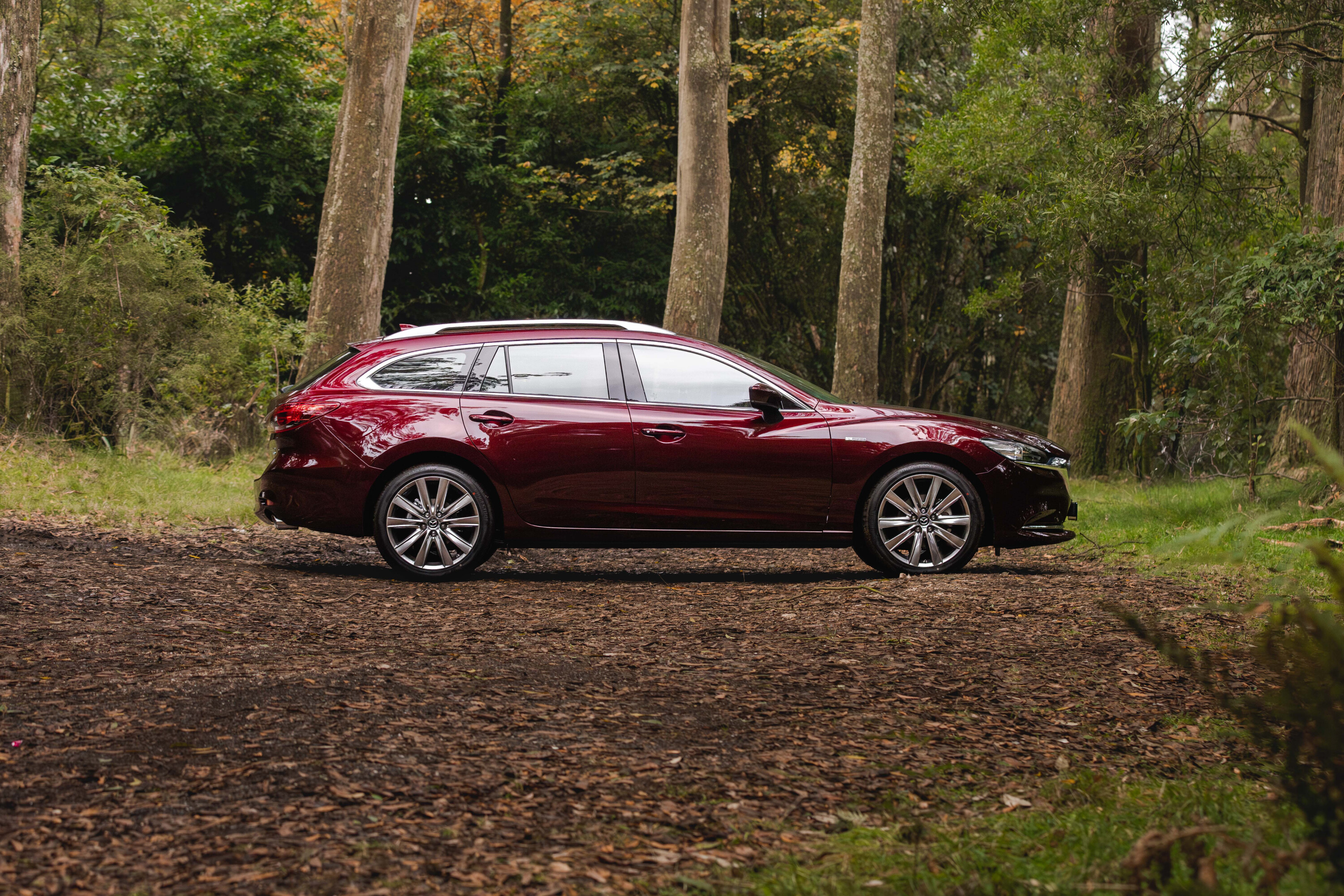
JUMP AHEAD
- How much is it, and what do you get?
- Where is this model in its lifecycle?
- How do rivals compare on value?
- Interior quality, comfort, space and storage
- Technology in the cabin
- What is it like to drive?
- How is it on fuel?
- How safe is it?
- Warranty and running costs
- VERDICT
- Specifications
How much is it, and what do you get?
The five-strong Mazda 6 range provides an option for almost everyone, with a sedan or wagon available for each grade.
It opens with the entry-level G25 Sport at $35,540 before on-road costs, while the flagship 20th Anniversary wagon tops the range at $54,935 plus on-roads.
Is the circa-$20,000 gap between the base Sport and the two range-toppers worth it? That depends on your needs, with the Sport and Touring likely to cater towards value-focused and ride-share buyers.
| 2023 Mazda 6 standard features | |
|---|---|
| 8-inch MZD Connect infotainment system | Satellite navigation |
| Apple CarPlay and Android Auto | Head-up display |
| DAB+ digital radio | Paddle shifters |
| LED headlights | Rain-sensing wipers |
| Dual-zone climate control | Tyre pressure monitoring |
Equipment for the base Sport is unchanged for 2023, with highlights including 17-inch alloy wheels, wired smartphone connectivity, heated and power-folding side mirrors, halogen daytime running lamps (DRLs), rear parking sensors, and cloth upholstery.
The mid-spec G25 Touring adds wireless phone charging and wireless Apple CarPlay – both new for 2023 – but Android Auto remains wired-only.
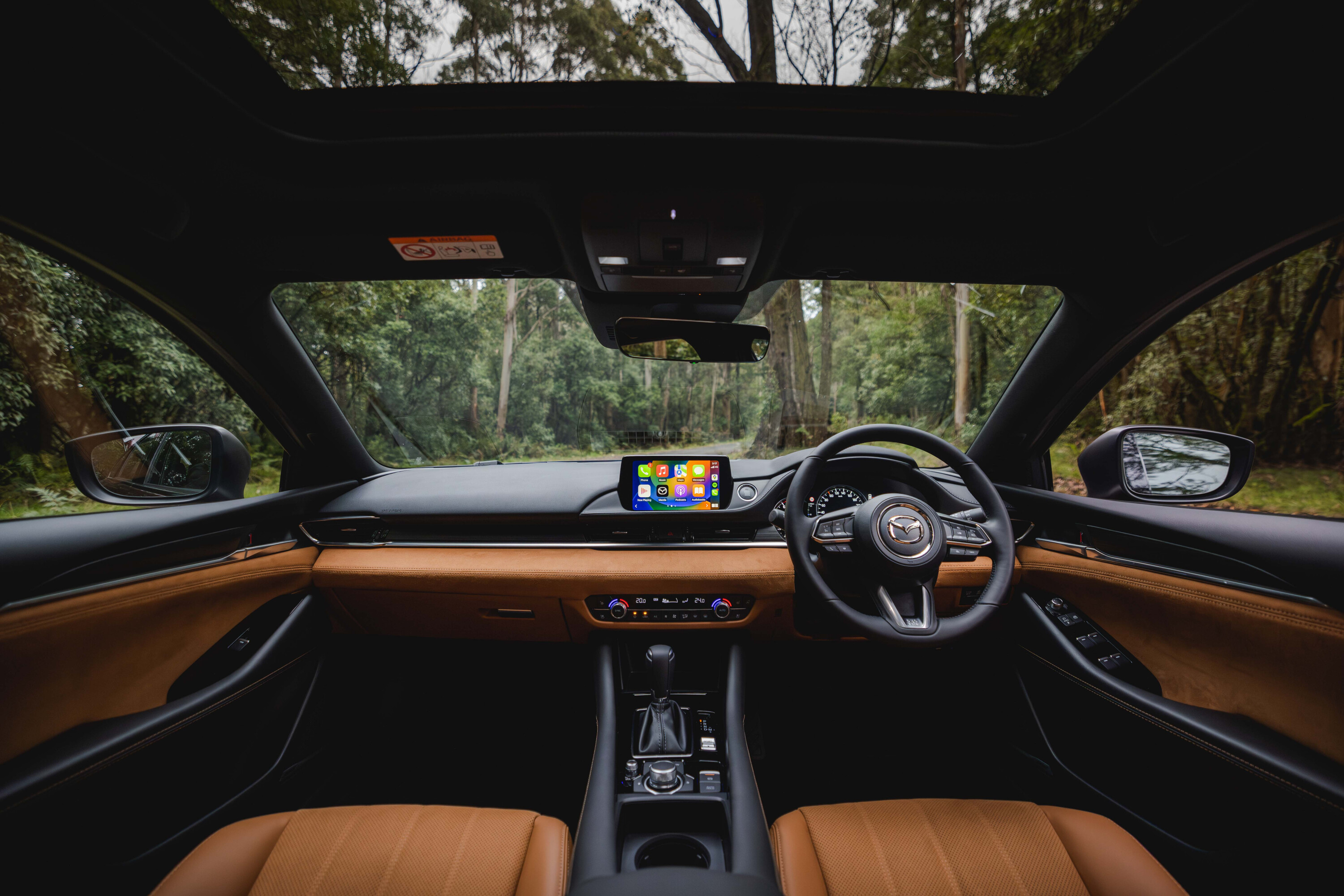
Other added features include LED DRLs, power-adjustable front seats, black leather upholstery, an 11-speaker Bose audio system, auto-folding side mirrors, keyless entry, and front parking sensors.
At the other end, the turbocharged GT SP, Atenza and 20th Anniversary provide an excellent package with a good mix of standard equipment and performance.
In addition to the added power, the G35 GT SP gains 19-inch alloy wheels, heated front and rear seats, an adaptive front-lighting system, while more darkened exterior trim and traffic jam assist are new for 2023.
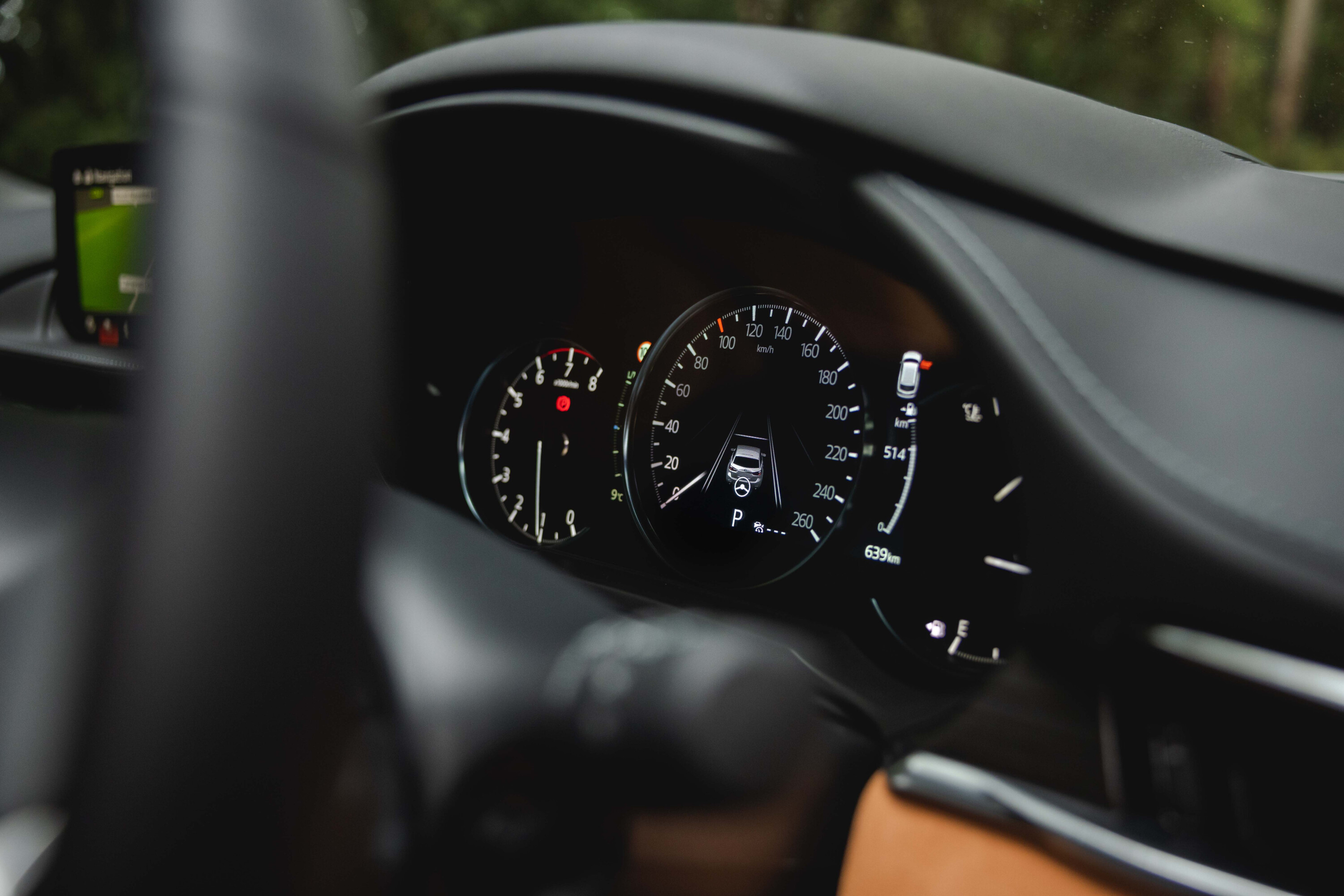
The flagship G35 Atenza adds black Nappa leather upholstery, a 7-inch semi-digital instrument cluster, ventilated front seats, a heated steering wheel, a 360-degree camera system, adaptive headlights, and more.
To celebrate two decades of the nameplate, the appropriately-named 20th Anniversary receives unique badging, tan Nappa leather and suede-look interior accents, and a ‘high-gloss’ grille and alloy wheels.
The ’20th’ is also is painted in Mazda’s beautiful new artisan red – unavailable on other grades – and rhodium white finishes.
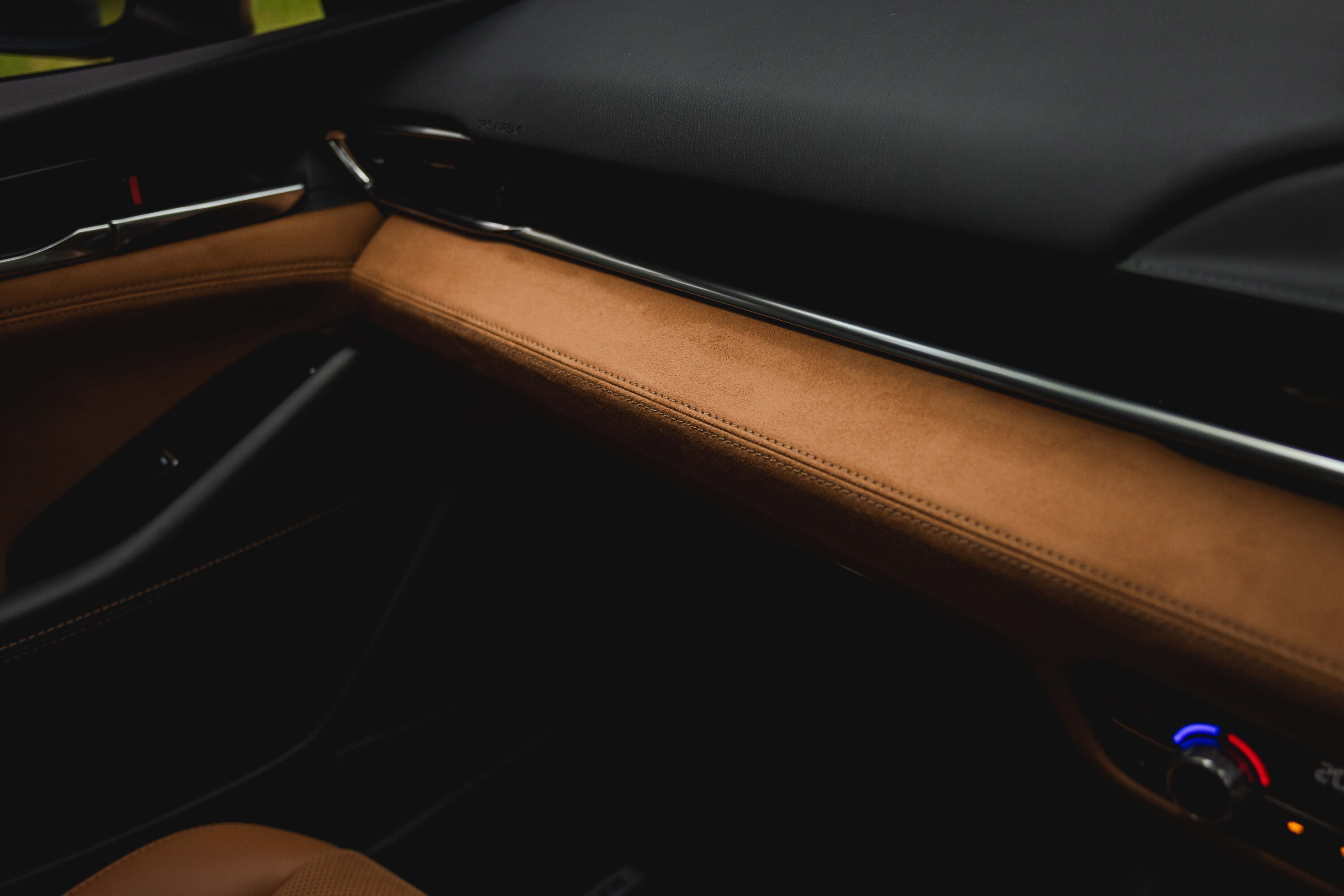
Mazda Australia expects a mostly-even sales mix in 2023, with 25 per cent of sales for the G25 Sport and Touring, 21 per cent for the G35 GT SP, 23 per cent for the G35 Atenza, and six per cent for the 20th Anniversary.
Available colours for all models – except the 20th Anniversary – include rhodium white, platinum quartz, sonic silver, soul red crystal, machine grey, polymetal grey, deep crystal blue, and jet black. Metallic paint incurs a $795 premium.
| 2023 Mazda 6 pricing (excludes on-road costs) | ||
|---|---|---|
| G25 Sport sedan | $35,540 | up $420 |
| G25 Sport wagon | $36,840 | up $420 |
| G25 Touring sedan | $40,210 | up $690 |
| G25 Touring wagon | $41,510 | up $690 |
| G35 GT SP sedan | $48,440 | up $1120 |
| G35 GT SP wagon | $49,470 | up $850 |
| G35 Atenza sedan | $51,840 | up $1120 |
| G35 Atenza wagon | $53,140 | up $1120 |
| 20th Anniversary sedan | $53,635 | new |
| 20th Anniversary wagon | $54,935 | new |
For a full pricing and features run-down, click on the link below.
Where is this model in its lifecycle?
The Mazda 6 is one of the oldest vehicles sold in Australia, with the third-generation model dating back to 2012.
However, several revisions over the past 11 years have kept it reasonably fresh, with a significant update in 2018 introducing the CX-9’s turbo-petrol and design elements shared with Mazda’s latest vehicles, including the 3 and CX-30.
Indeed, it would be challenging to find the similarities between a 2012 and 2023 model at first glance – something that can’t be said for the also-old Mitsubishi ASX and Nissan Patrol.
While rumours suggested a next-generation Mazda 6 could debut in the early 2020s with rear-wheel-drive and a straight-six turbo-petrol from the CX-60 and CX-90, it appears the project is dead – or at least on the back burner.
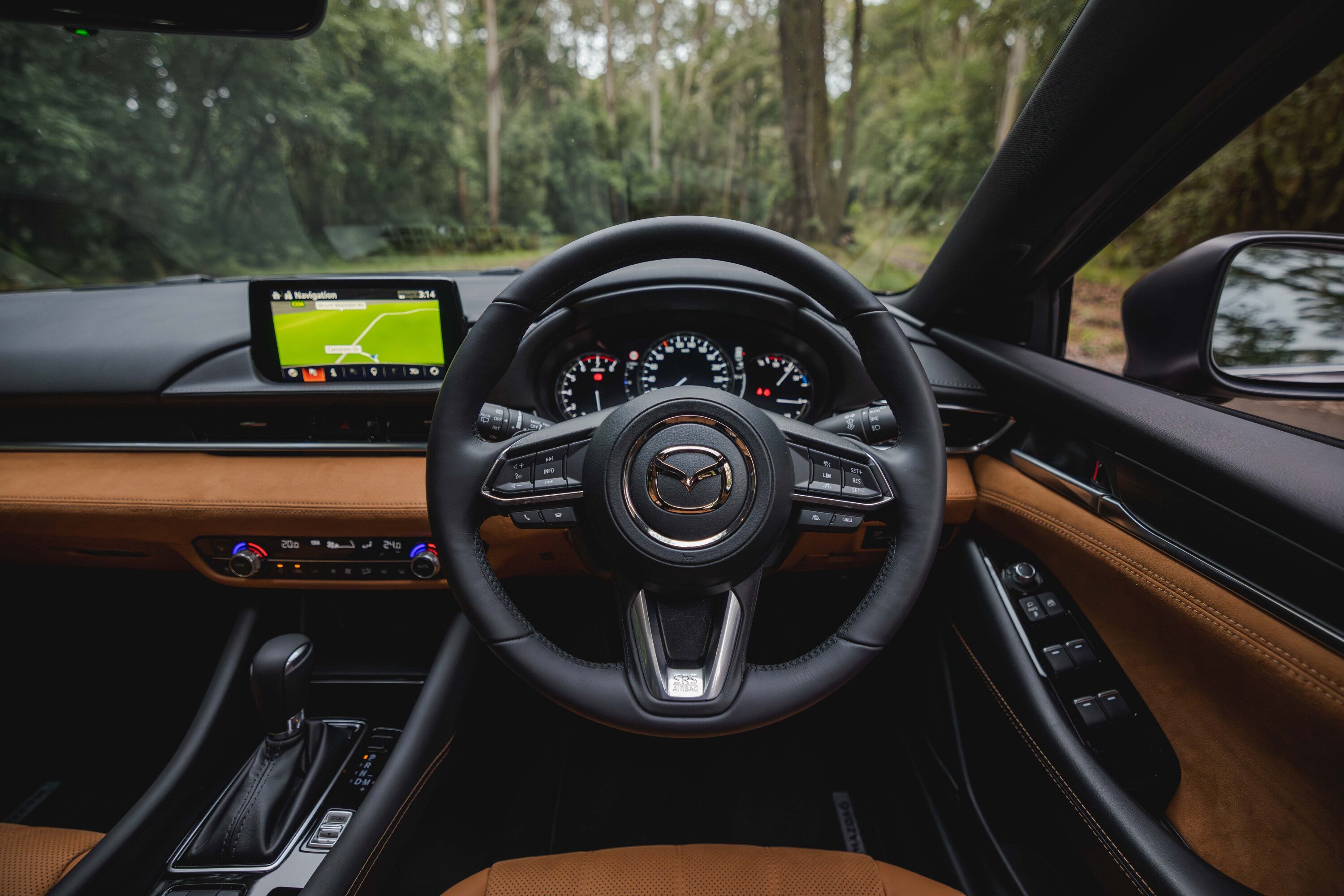
How do rivals compare on value?
Following the launch of the third-gen 6 in 2012, Mazda sold almost 8000 examples in its first full-year of sale – with declining sales in the decade to today.
At the time, its competitors included the Toyota Camry, Ford Mondeo, Honda Accord, Hyundai i40 and i45 (née Sonata), Kia Optima, Skoda Octavia, Subaru Liberty, and the Volkswagen Passat.
As mid-size SUVs rapidly became the default family choice, slow sales for sedans – including even the new-for-then Holden Malibu and Nissan Altima – were a sign of what was to come, with just six midsized passenger vehicles available in Australia in 2023.
This year, VFACTS new-car sales data reveals 623 examples of the Mazda 6 have been sold in Australia so far, placing it behind the popular Camry (1886) – but ahead of the Skoda Octavia (474), Volkswagen Passat (259), Hyundai Sonata (90), and Honda Accord (37).
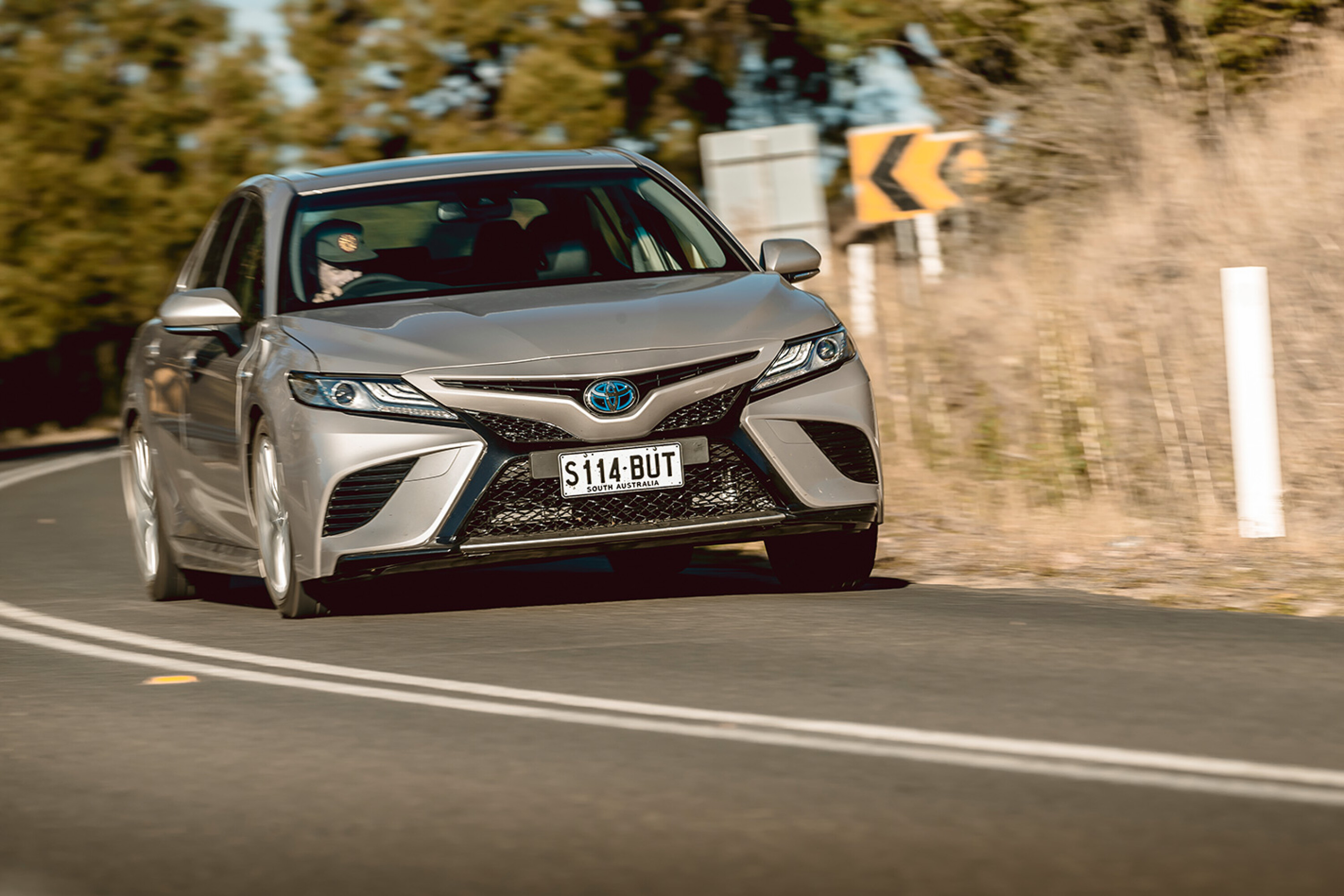
For buyers looking to cut fuel use, the Camry Hybrid is the automatic choice, with an ultra-efficient claim as low as 4.2L/100km – while the Accord Hybrid is a niche electrified offering.
However, even in its old age, the 6’s true closest rivals – at least for the turbo variants – are the Sonata N Line sedan and Passat wagon, with both vehicles offering a blend of decent performance and a premium-feeling cabin.
Inside, the Sonata and Passat offer larger and vastly more modern infotainment systems, a full-digital instrument cluster, and USB-C ports – but the 6’s cabin still holds up quite well.
Apart from the small and outdated MZD Connect system, that is.
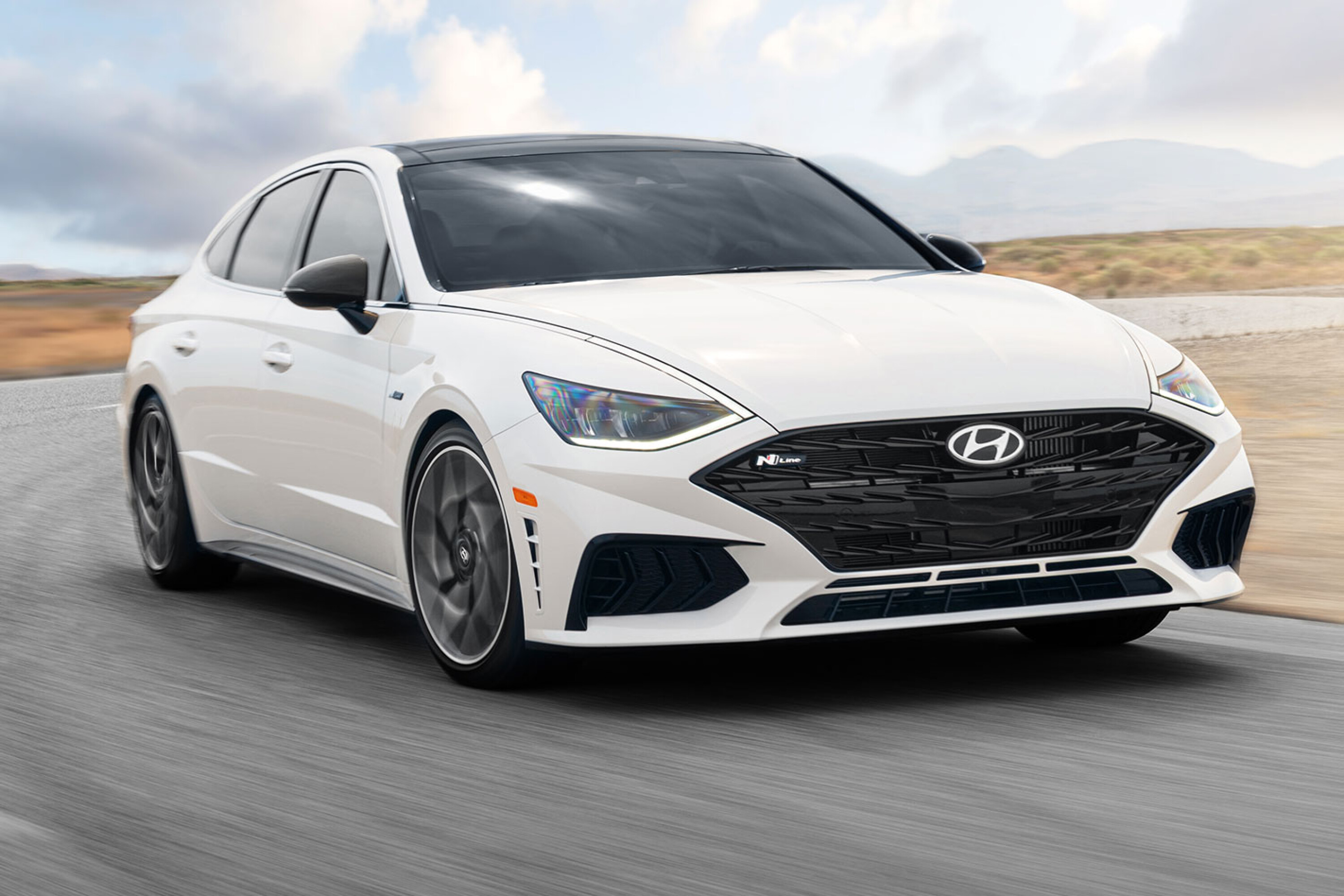
Interior quality, comfort, space and storage
Five years after its second redesign, the Mazda 6’s cabin remains top-notch.
It looks and feels like a premium vehicle – particularly for the Atenza and 20th Anniversary with Nappa leather upholstery, suede trim, and subtle real wood accents.
As expected from a modern Mazda, there are soft-feeling yet durable materials, a solid build quality, and tactile controls.
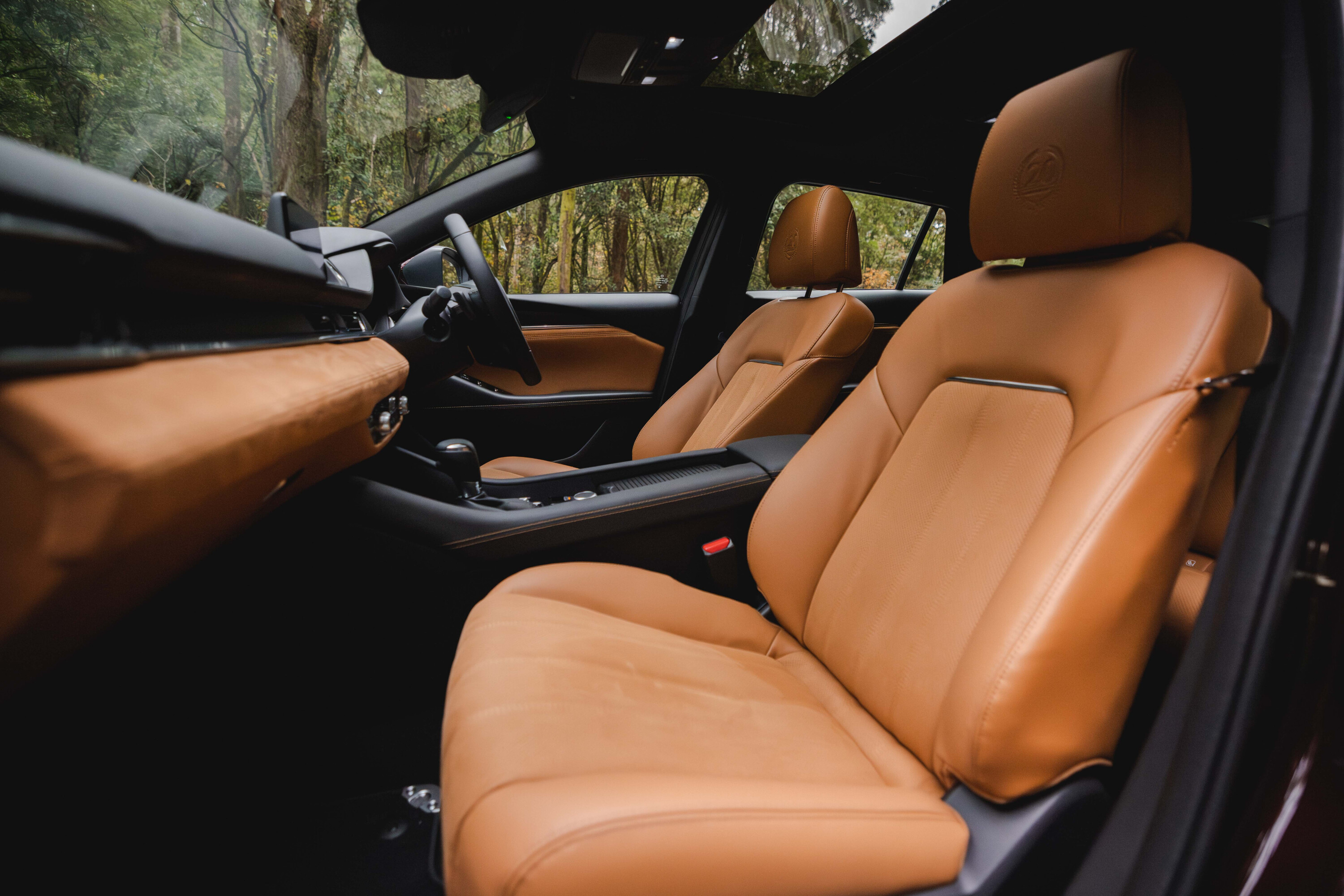
All versions, bar the base Sport, feature a 10-way power-adjustable driver’s seat with two-position memory, allowing you to discover a suitable driving position.
In the rear, the Mazda 6 is comfortable for two adults, while there are two ISOFIX and three top-tether points for mounting child seats.
The new-for-2023 wireless phone charger sits ahead of the gear shifter, which can alternate as a storage nook for smaller items. A sliding centre console lid hides two cup holders, while the door bins can accommodate standard-sized bottles.
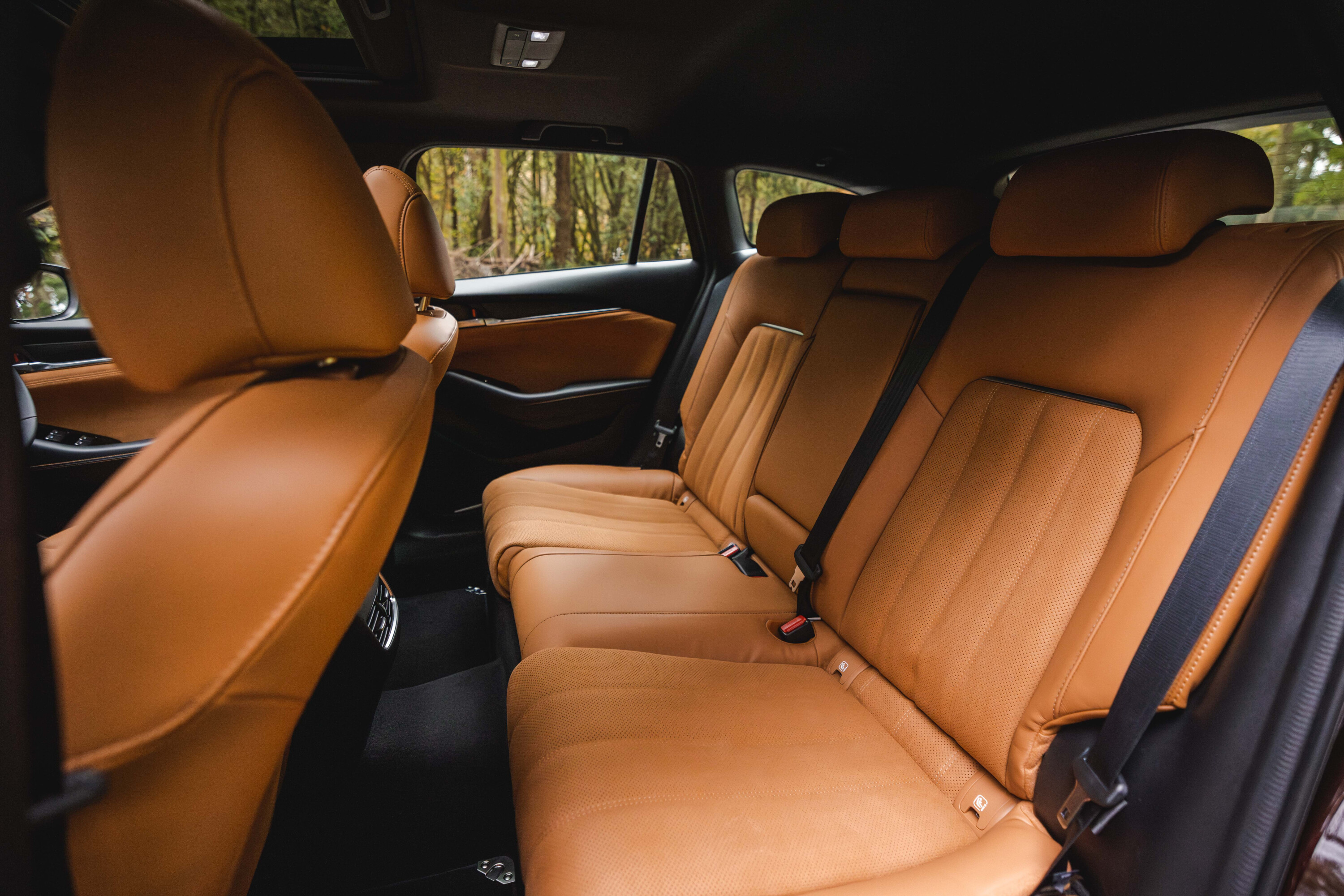
2023 Mazda 6 boot space
Boot space is ample in the sedan at 474 litres when the back seats are up; however, this is less than the Camry (524L) and Octavia liftback (600L).
The 60:40 split rear seats can be folded using either the tabs just next to the outer headrests or two handy levers in the boot, although pulling these still requires you to open the rear doors to fold the seatbacks.
For the 6 wagon (which is actually shorter than the sedan), boot capacity is raised to 506 litres when the second row is up, increasing to 1648 litres when folded down – second only to the Octavia wagon, by 52 litres.
Mazda’s popular CX-5 medium SUV has a reduced luggage capacity at 438L or 1348L with the second-row folded – which says something about what buyers really prize when it comes to height versus space. Like the CX-5, the 6 wagon has a handy cover that rises with the tailgate.
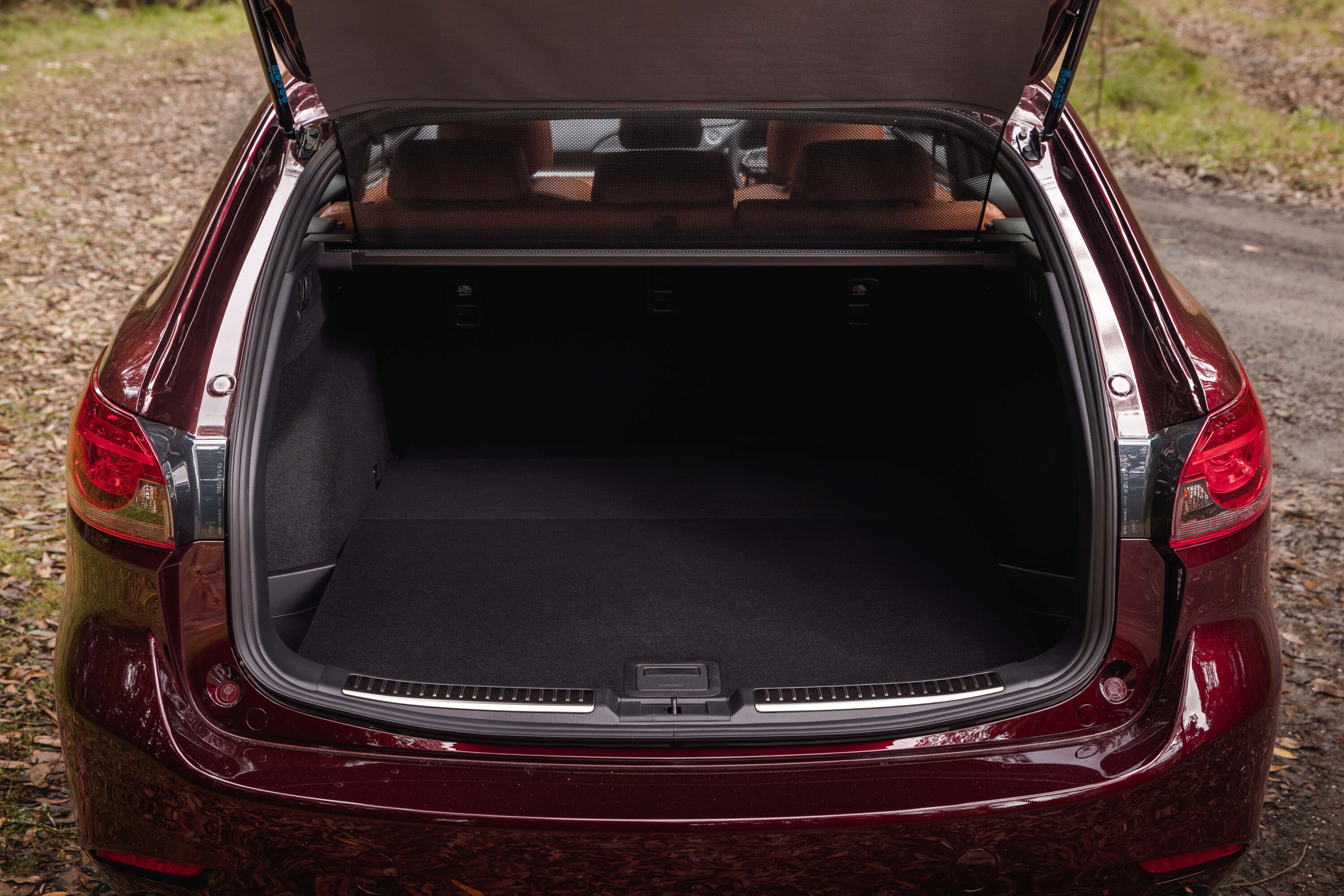
Technology in the cabin
The Mazda 6’s merits are let down by the ageing MZD Connect infotainment – but that could appeal to buyers looking for a simple-to-use system in 2023.
Introduced for the 6’s first facelift in 2015, the screen grew to eight inches with the second major update in 2018, with Apple CarPlay and Android Auto smartphone connectivity added shortly after.
Controlled by a rotary dial on the centre console or as a touchscreen when stationary, the system is easy to operate – but outdated graphics, slow processing power, and low-resolution cameras plague it. (Being forced to use the rotary dial to navigate the touch-oriented CarPlay and Android Auto while on the move feels like an insult in concept, but you get used to it – Ed.)
For 2023, the MZD Connect system now supports wireless Apple CarPlay for the G25 Touring and above – but Android Auto remains wired only. A wireless phone charger is standard for these variants.
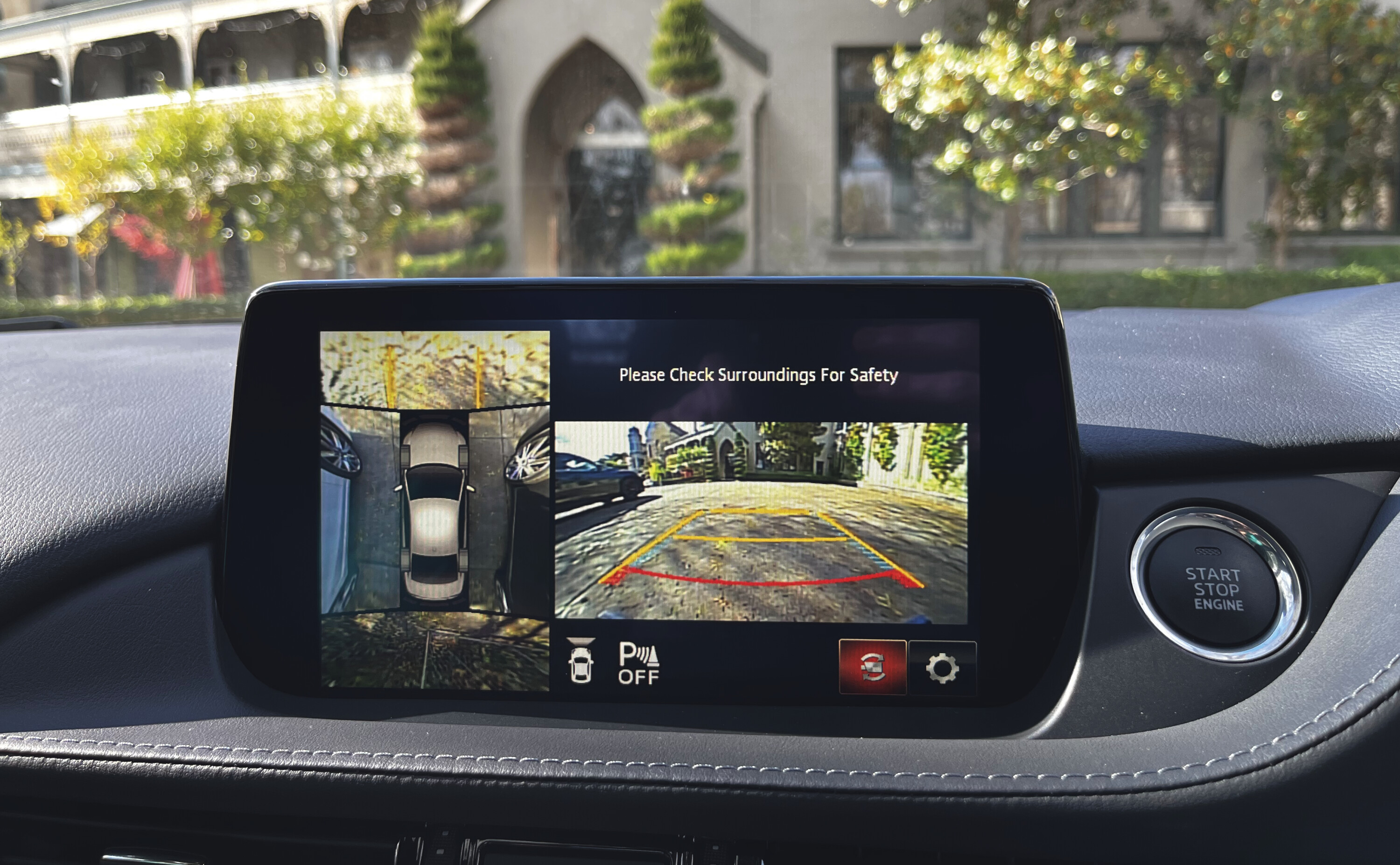
With the introduction of a larger 10.25-inch screen running Mazda’s second-generation infotainment system for the CX-5, CX-8 and CX-9 SUVs, the lack of similar investment for the 6 is disappointing but not surprising.
Criticising the Mazda 6’s infotainment system is difficult without mentioning the Toyota Camry, which suffers from similar drawbacks – while the RAV4 storms ahead with a larger, brand-new unit.
Perhaps a good solution could be for Mazda to adapt its newest software to operate on the existing screen, but it appears the MZD system will remain for the remainder of the 6’s lifecycle. (We’d be surprised if it survives beyond 2024 – Ed.)
The centre console has two USB-A ports, while rear-seat passengers are treated to an identical count in the fold-down armrest.
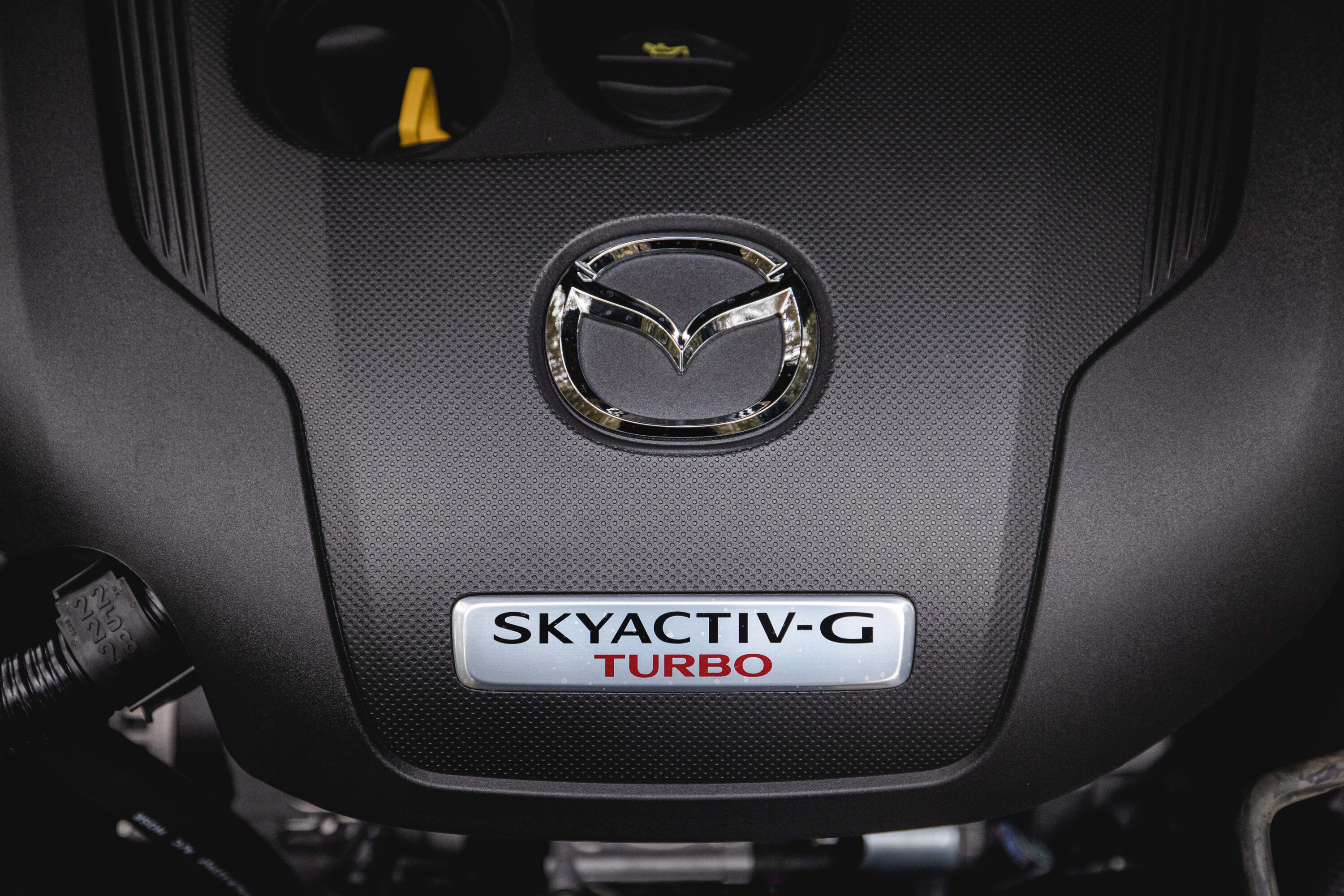
What is it like to drive?
With the 2.5-litre turbo-petrol four-cylinder fitted to our tester, the 6 feels poised and compliant.
Power is up 3kW to 173kW, and the updated torque band has a further 8Nm available at 4250rpm is said to improve full throttle performance – but peak torque remains unchanged at 420Nm.
It’s hard to tell if there’s any significant difference between old and new without driving them back-to-back, but the turbo-petrol 6 remains a compelling choice.
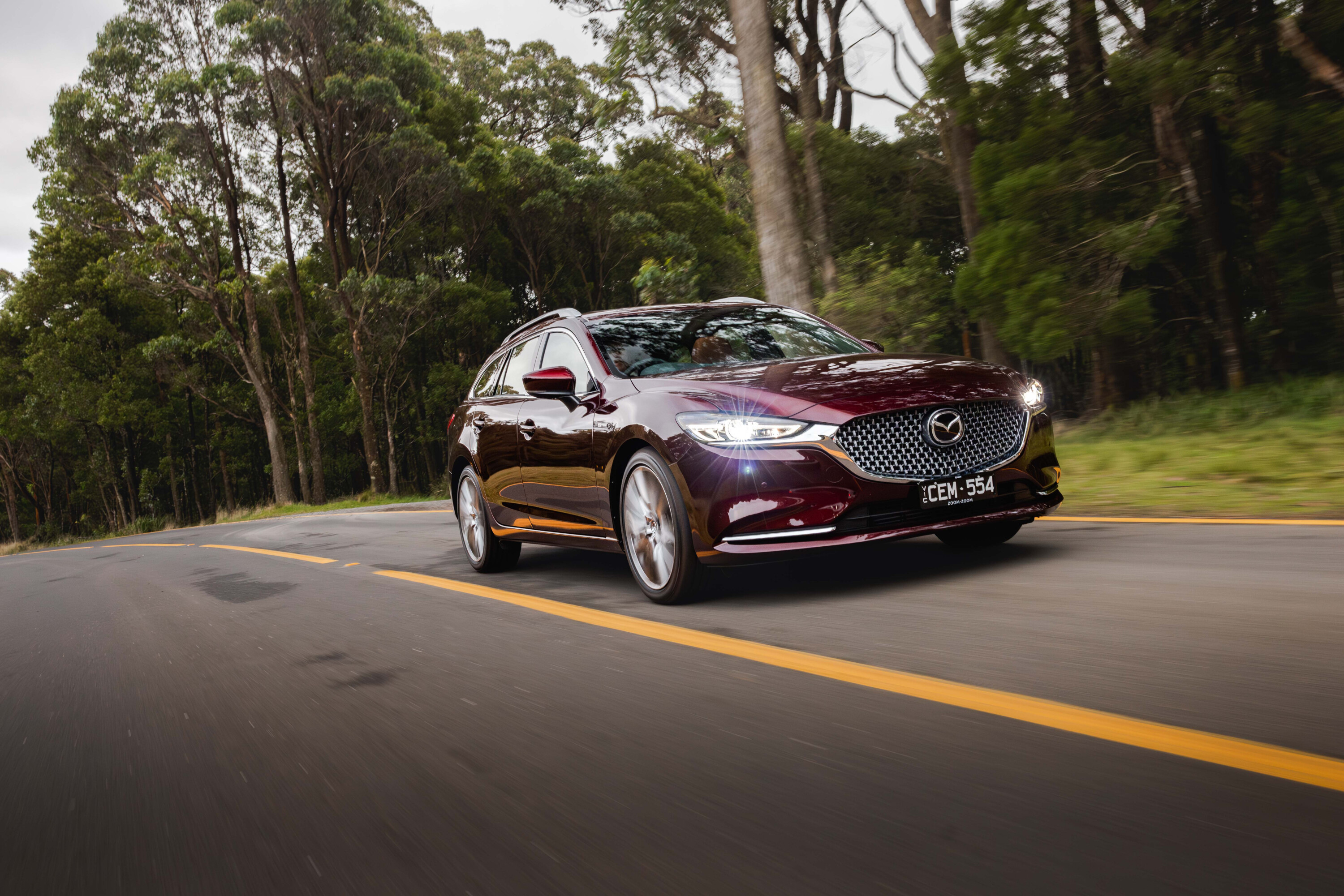
Mazda has also retuned the six-speed (six!) automatic transmission and increased the reactive force of the accelerator pedal for turbo models, while all variants have updated power-steering characteristics.
Unlike the base naturally-aspirated petrol that can become stressed and noisy under heavy load, the added boost of the turbo ensures greater confidence – particularly when overtaking or climbing steep hills.
Noise suppression is excellent (historically not this generation’s strong suit), with little road, wind or engine noise penetrating the cabin at higher speeds.
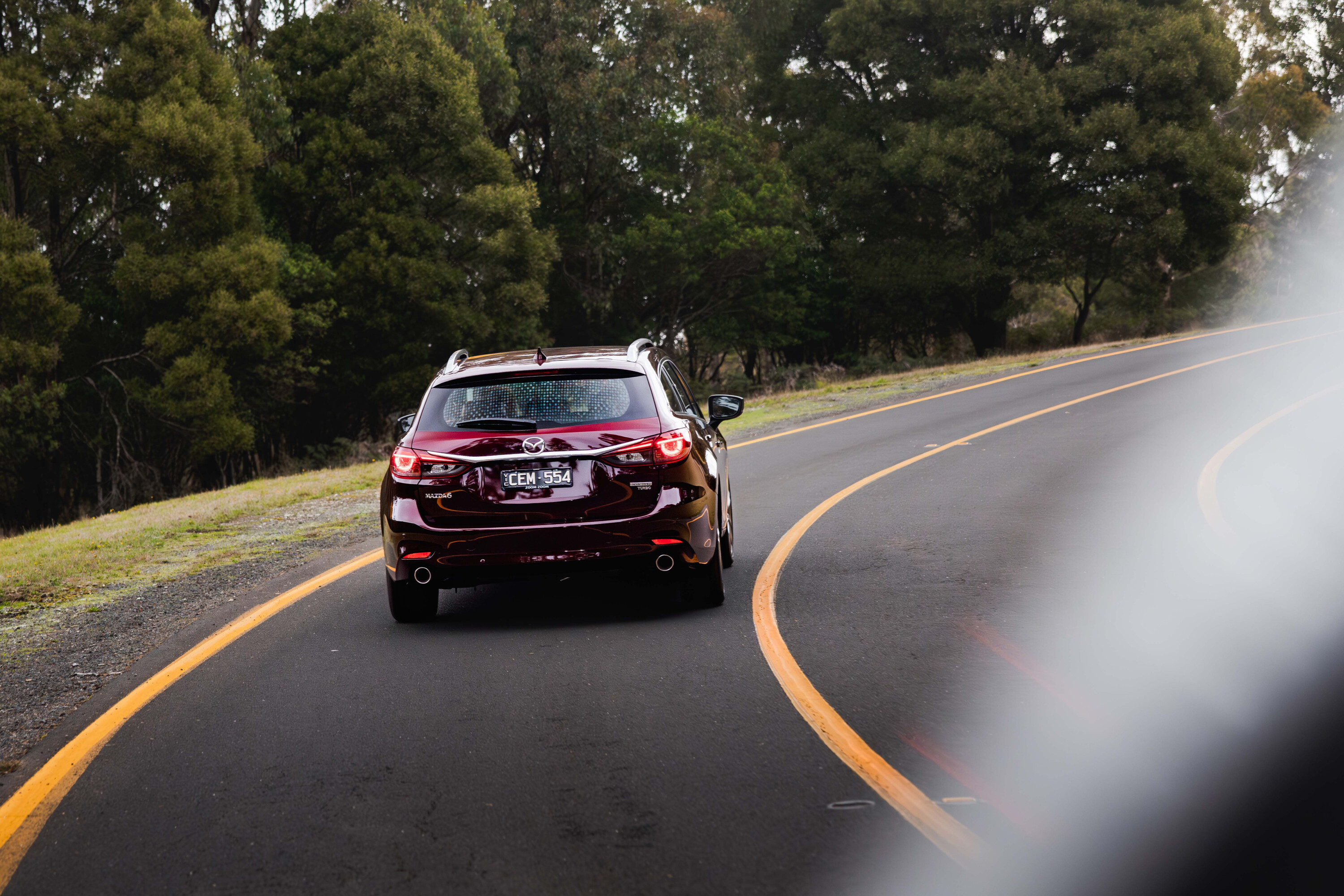
Handling is excellent for a midsized car, with a light steering feel and a smooth ride placing it towards the top of the segment – but it remains humble without the sportier bent you’d expect from an Octavia RS or Sonata N Line.
All variants have a traditional six-speed torque-converter automatic transmission, with power exclusively sent to the front wheels.
How is it on fuel?
The turbocharged Mazda 6 G35 is rated to use 7.6L/100km in combined ADR testing (an older and less ‘real world’ accurate test than the WLTP system quoted by Euro-centric brands).
In the real world, you’ll see that number rise closer to 9.0L/100km, with our spirited test loop in a G35 Atenza sedan returning 9.3L/100km – though it’ll likely fall closer to the claimed figure on highway trips.
While Mazda Australia didn’t provide any non-turbo variants at this launch event, it claims 7.0L/100km on the combined cycle. Previous real-world testing of the G25 Sport sedan in 2022 returned 9.0L/100km.
Both powertrains feature an idle stop/start system and are compatible with 91RON unleaded petrol, with a 62-litre tank.
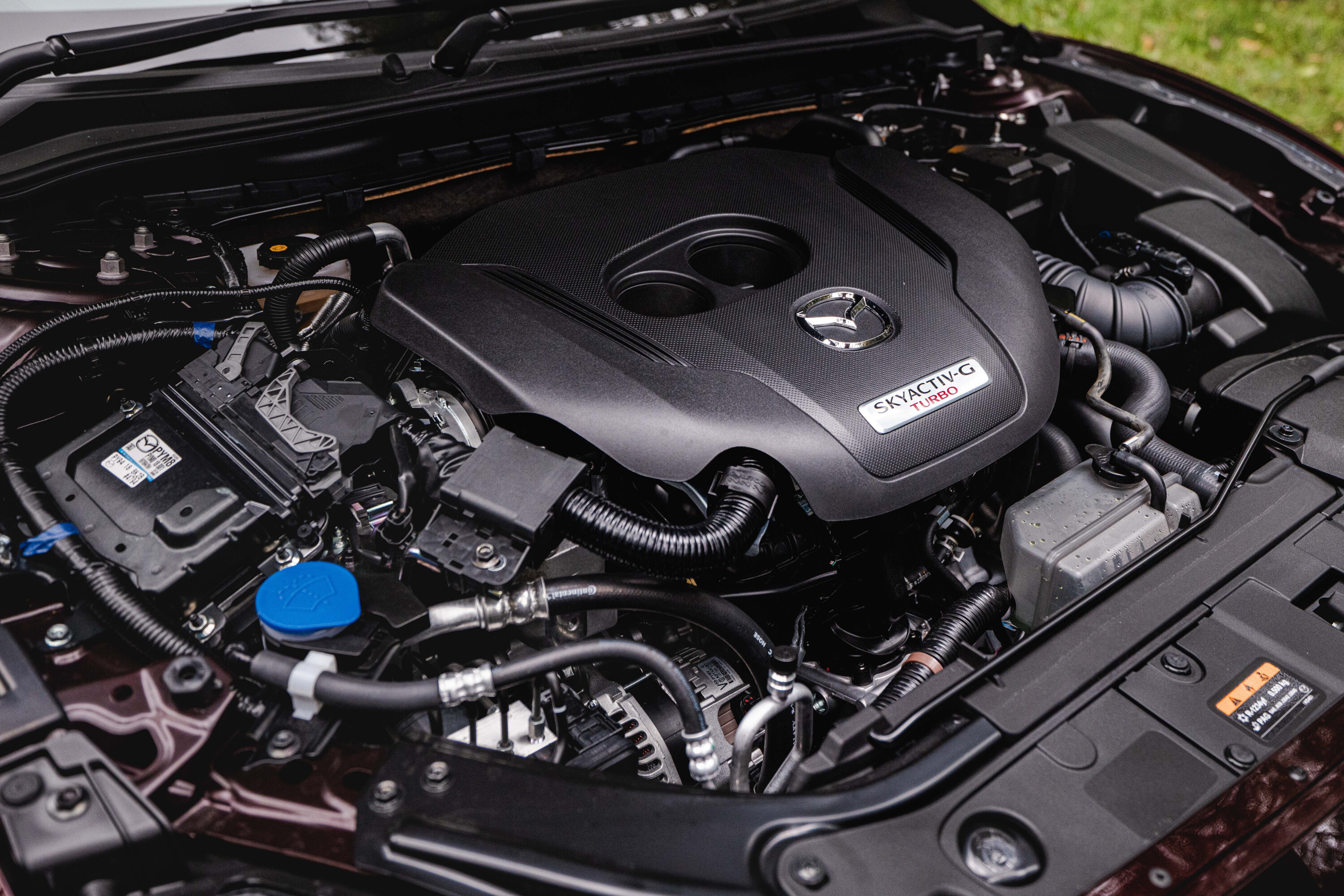
Mini matchup: Fuel consumption
| Model | Minimum RON | Combined fuel consumption (ADR) |
|---|---|---|
| Mazda 6 20th Anniversary | 91 RON | 7.6L/100km |
| Toyota Camry SL | 95 RON | 4.5L/100km |
| Hyundai Sonata N Line | 91 RON | 8.1L/100km |

How safe is it?
The Mazda 6 range is covered by a five-year ANCAP safety rating, based on testing conducted in 2018.
Six airbags – dual front, side and curtain – are fitted, with no knee or front-centre airbags to prevent head clashes between the driver and front passenger in a side-impact collision.
As standard, the Mazda 6 includes a full suite of active safety technology, including autonomous emergency braking (vehicle, pedestrian, cyclist and reverse), adaptive cruise control, lane-keep assist, lane departure warning, blind-spot alert, rear cross-traffic alert and traffic sign recognition.
The lane-keep assist can become intrusive around town and on country roads, but the sensitivity and audible warnings can be removed or reduced within the infotainment system.
Traffic jam assist – a combination of adaptive cruise control and lane-keep assist – for the G35 GT SP and above allows for semi-autonomous driving in slow-moving traffic, which is a decent addition for an ageing vehicle.
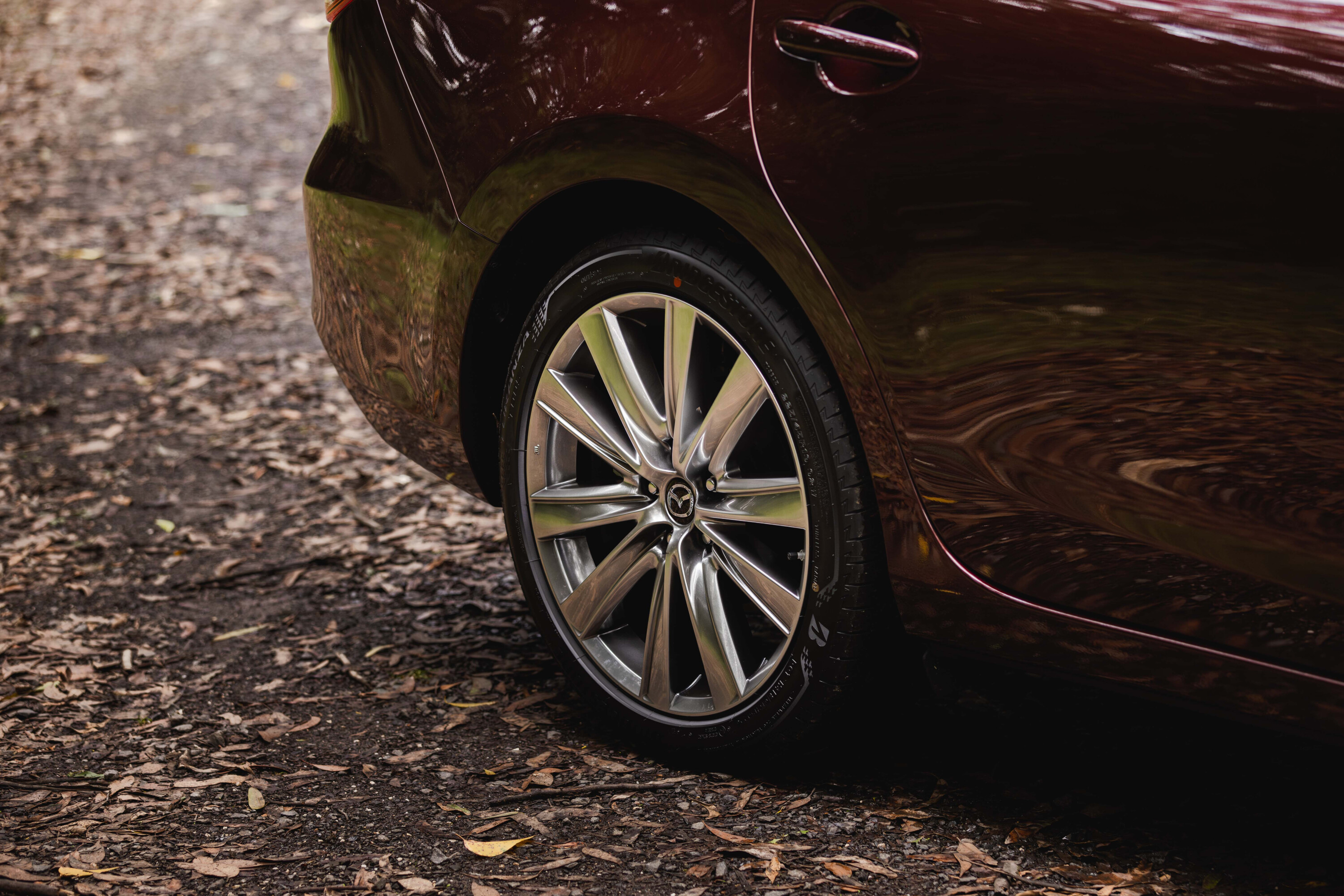
Warranty and running costs
As with the wider Mazda range, the 6 is covered by the brand’s five-year, unlimited-kilometre warranty.
There’s also five years of capped-price servicing and roadside assistance, with no requirement for annual dealer servicing to retain the service, unlike some other manufacturers.
The Mazda 6’s service intervals now align with most of its competitors at 12 months or 15,000 kilometres, whichever occurs first – up from 10,000km.
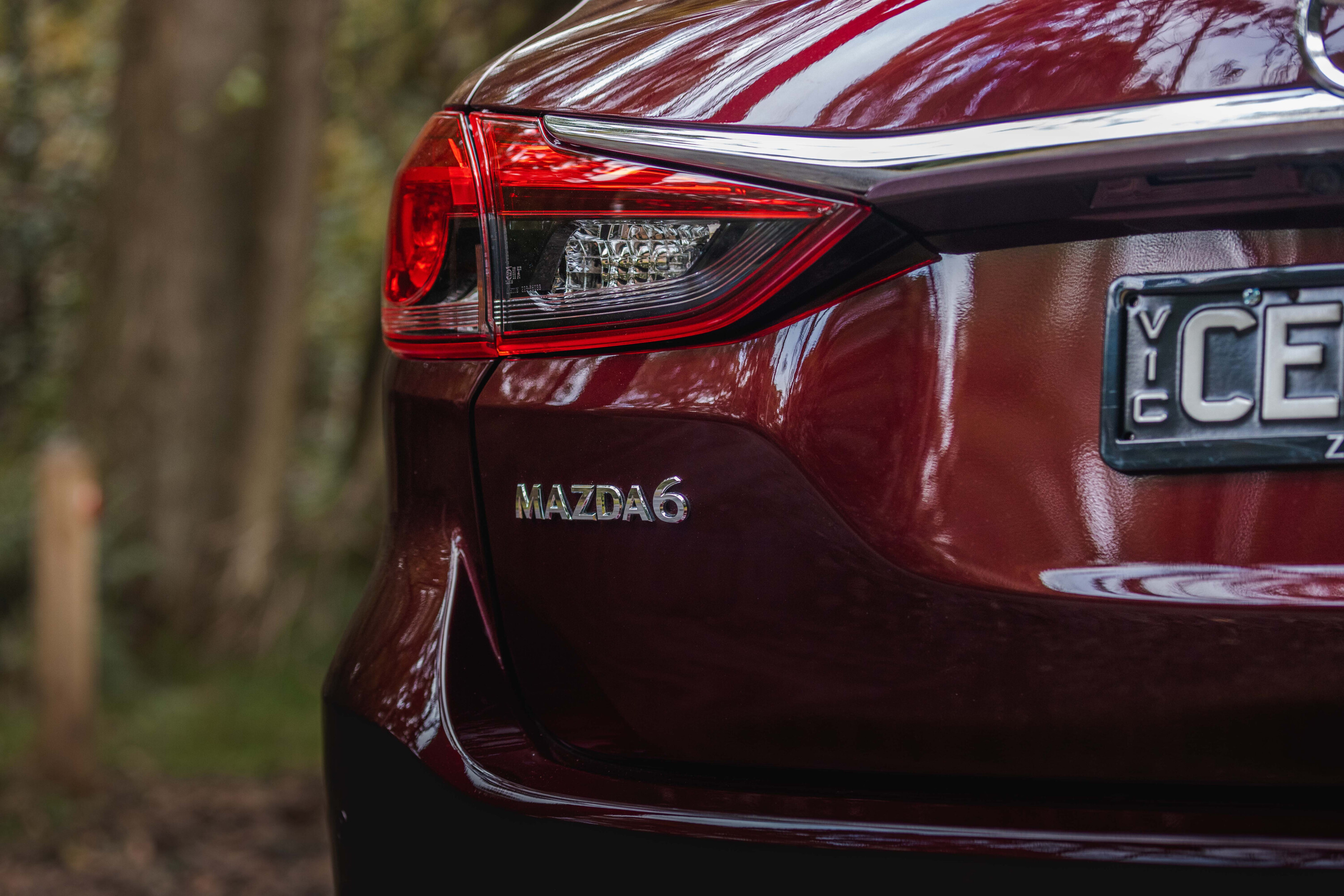
While service pricing for naturally-aspirated petrol and turbo-petrol is mostly aligned, the latter requires new spark plugs every four years – necessitating a higher cost.
| 2023 Mazda 6 service pricing | ||
|---|---|---|
| Service interval | G25 petrol | G35 turbo-petrol |
| One year/15,000km | $341 | $354 |
| Two years/30,000km | $515 | $528 |
| Three years/45,000km | $402 | $439 |
| Four years/60,000km | $515 | $830 |
| Five years/75,000km | $341 | $354 |
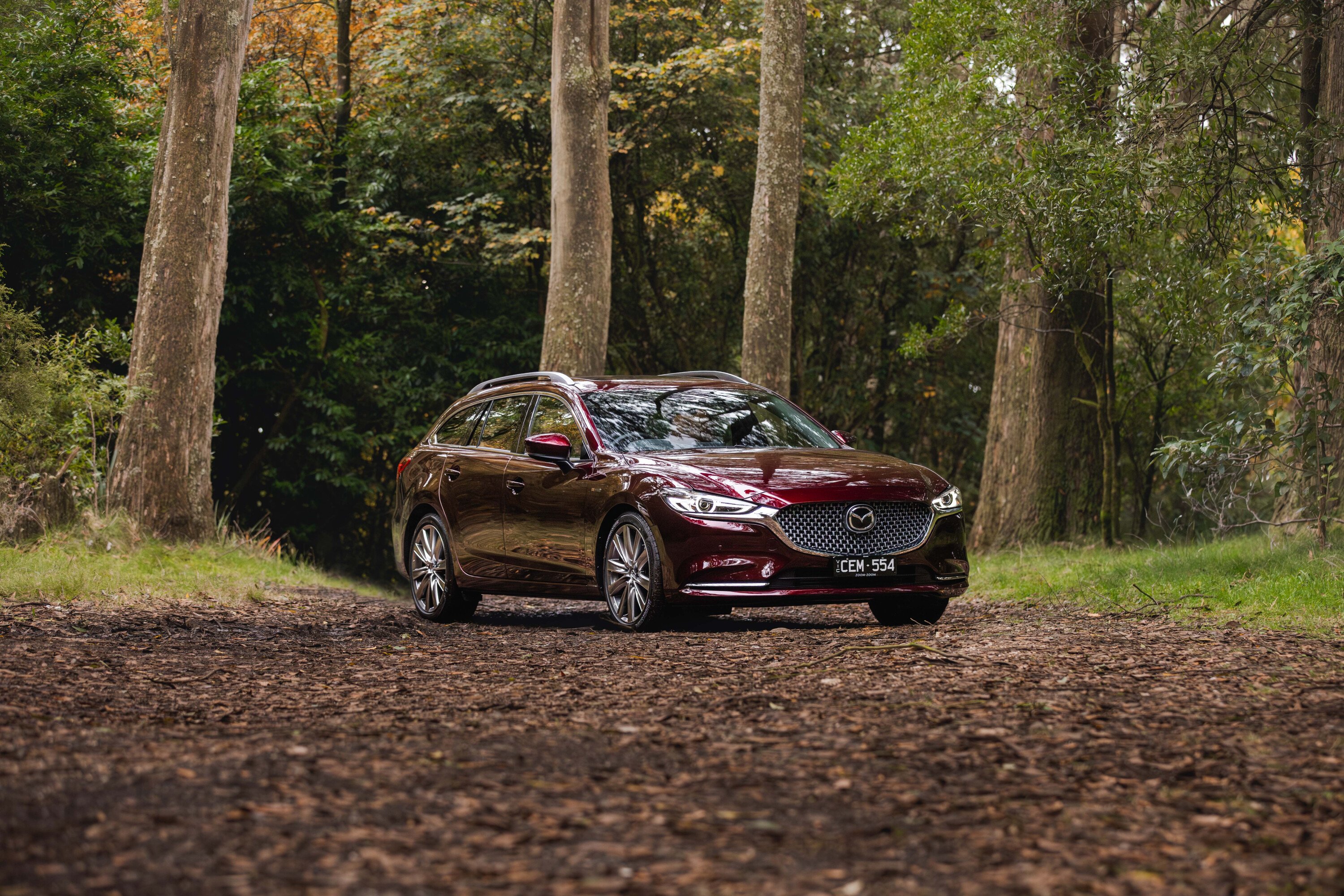
VERDICT
It might be one of Australia’s oldest cars, but the Mazda 6 certainly doesn’t feel it.
With plenty of updates over the years, Mazda has kept it suitably fresh – and the addition of the CX-9’s turbo-petrol in 2018 certainly helped.
Not only is a range-topping 6 cheaper than Mazda’s top-selling CX-5 medium SUV, but it’s also nicer to drive and the wagon has more luggage capacity.
That’s not to say the CX-5 is or isn’t a more-practical family choice, with its higher ground clearance and all-wheel-drive but smaller boot – and the 6’s ageing design, particularly for its infotainment system, makes it hard to recommend over the fresher CX-5.
However, for buyers opposed to the SUV norm, the updated Mazda 6 remains an excellent option in the under-appreciated medium passenger segment – especially in wagon form.
| 2023 Mazda 6 20th Anniversary specifications | ||
|---|---|---|
| Engine | 2.5-litre turbo-petrol four-cylinder | |
| Power @rpm | 173kW @4250rpm | |
| Torque @rpm | 420Nm @2000rpm | |
| Transmission | Six-speed torque converter automatic | |
| Body | 4-door sedan or 5-door wagon | |
| L/W/H | Sedan: 4865/1840/1450mm; wagon: 4800/1840/1480mm | |
| Wheelbase | Sedan: 2830mm; wagon: 2750mm | |
| Boot space | Sedan: 474L; wagon: 506L/1648L | |
| Weight | Sedan: 1570kg; wagon: 1575kg | |
| Fuel / tank | 91 RON / 62 litres | |
| Fuel use L/100km | 7.6L (claimed) | 9.3L (on test) |
| Suspension | Front: struts / Rear: multi-link | |
| Steering | Electric rack-and-pinion; 11.0mu00a0 | |
| Brakes | Front: ventilated discs / Rear: solid discs | |
| Wheels | 19-inch alloy | |
| Tyres | Bridgestone Turanza T005A | |
| Tyre size & spare | 225/45R19, space-saver spare | |
Score breakdown
Things we like
- Excellent turbo engine
- Updated technology
- 20th Anniversary special
- Improved service intervals
Not so much
- Outdated infotainment system
- Lacks wireless Android Auto
- Thirsty powertrains
- No spec updates for base model
We recommend
-
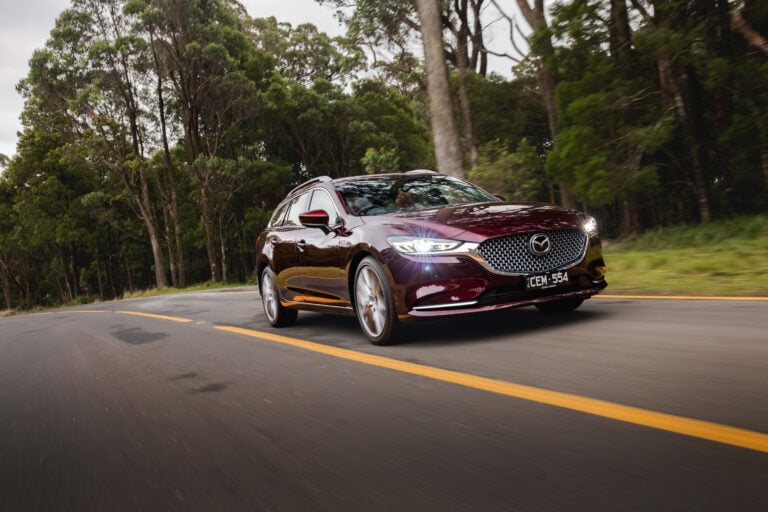 News
News2023 Mazda 6 pricing and features: 20th Anniversary edition, new tech
Mazda's venerable mid-size sedan and wagon has received an update for 2023, as the nameplate celebrates its 20th year on sale
-
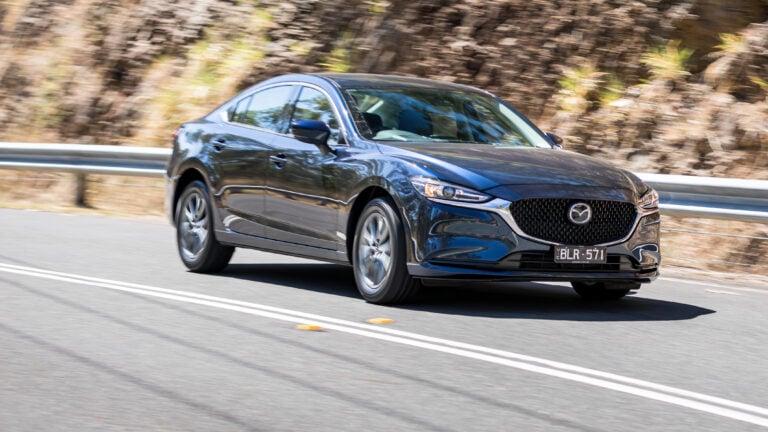 Reviews
Reviews2021 Mazda 6 Sport review
On an ageing platform, does Mazda’s midsize sedan still have 6 appeal?
-
 News
NewsNew car calendar 2026: All the new cars coming to Australia next year
Here’s the WhichCar by Wheels guide to all the new cars that will launch in Australia in 2026. Check back in regularly for updates...


